World Religions in Practice: A Study of Buddhism and Desire Management
VerifiedAdded on 2023/04/26
|7
|2162
|459
Essay
AI Summary
This essay delves into the core principles and practices of Buddhism, focusing on its approach to managing human desires, emotions, and negative feelings. It examines how Buddhism views desire as a root cause of suffering and explores various techniques, such as meditation, mindfulness, Metta, and the Vajrayana tradition, to control and redirect desires, including sexual desires, anger, jealousy, and envy. The essay outlines the daily routines of Buddhist monks, core beliefs, and the concept of karma and samsara, illustrating how these concepts contribute to a peaceful and fulfilling life. It emphasizes the importance of practices like mindfulness and loving-kindness to overcome negative emotions and cultivate a positive state of mind, ultimately promoting inner peace and well-being. The essay references various scholarly sources to support its claims and provides a comprehensive overview of how Buddhism offers practical guidance for managing life's challenges.

Running Head: BUDDHISM 0
BUDDHISM
World Religions in practice
System04122
2/1/2019
BUDDHISM
World Religions in practice
System04122
2/1/2019
Paraphrase This Document
Need a fresh take? Get an instant paraphrase of this document with our AI Paraphraser
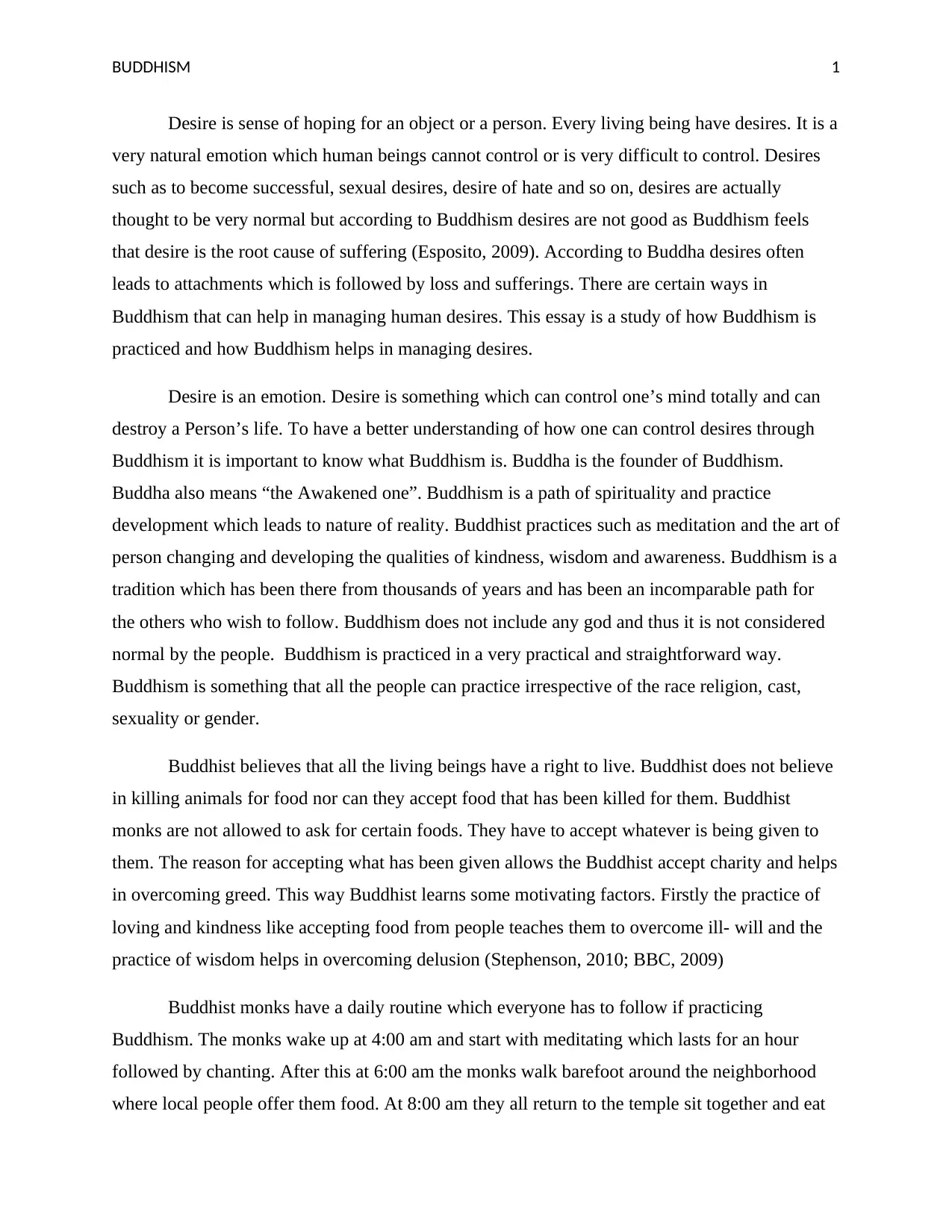
BUDDHISM 1
Desire is sense of hoping for an object or a person. Every living being have desires. It is a
very natural emotion which human beings cannot control or is very difficult to control. Desires
such as to become successful, sexual desires, desire of hate and so on, desires are actually
thought to be very normal but according to Buddhism desires are not good as Buddhism feels
that desire is the root cause of suffering (Esposito, 2009). According to Buddha desires often
leads to attachments which is followed by loss and sufferings. There are certain ways in
Buddhism that can help in managing human desires. This essay is a study of how Buddhism is
practiced and how Buddhism helps in managing desires.
Desire is an emotion. Desire is something which can control one’s mind totally and can
destroy a Person’s life. To have a better understanding of how one can control desires through
Buddhism it is important to know what Buddhism is. Buddha is the founder of Buddhism.
Buddha also means “the Awakened one”. Buddhism is a path of spirituality and practice
development which leads to nature of reality. Buddhist practices such as meditation and the art of
person changing and developing the qualities of kindness, wisdom and awareness. Buddhism is a
tradition which has been there from thousands of years and has been an incomparable path for
the others who wish to follow. Buddhism does not include any god and thus it is not considered
normal by the people. Buddhism is practiced in a very practical and straightforward way.
Buddhism is something that all the people can practice irrespective of the race religion, cast,
sexuality or gender.
Buddhist believes that all the living beings have a right to live. Buddhist does not believe
in killing animals for food nor can they accept food that has been killed for them. Buddhist
monks are not allowed to ask for certain foods. They have to accept whatever is being given to
them. The reason for accepting what has been given allows the Buddhist accept charity and helps
in overcoming greed. This way Buddhist learns some motivating factors. Firstly the practice of
loving and kindness like accepting food from people teaches them to overcome ill- will and the
practice of wisdom helps in overcoming delusion (Stephenson, 2010; BBC, 2009)
Buddhist monks have a daily routine which everyone has to follow if practicing
Buddhism. The monks wake up at 4:00 am and start with meditating which lasts for an hour
followed by chanting. After this at 6:00 am the monks walk barefoot around the neighborhood
where local people offer them food. At 8:00 am they all return to the temple sit together and eat
Desire is sense of hoping for an object or a person. Every living being have desires. It is a
very natural emotion which human beings cannot control or is very difficult to control. Desires
such as to become successful, sexual desires, desire of hate and so on, desires are actually
thought to be very normal but according to Buddhism desires are not good as Buddhism feels
that desire is the root cause of suffering (Esposito, 2009). According to Buddha desires often
leads to attachments which is followed by loss and sufferings. There are certain ways in
Buddhism that can help in managing human desires. This essay is a study of how Buddhism is
practiced and how Buddhism helps in managing desires.
Desire is an emotion. Desire is something which can control one’s mind totally and can
destroy a Person’s life. To have a better understanding of how one can control desires through
Buddhism it is important to know what Buddhism is. Buddha is the founder of Buddhism.
Buddha also means “the Awakened one”. Buddhism is a path of spirituality and practice
development which leads to nature of reality. Buddhist practices such as meditation and the art of
person changing and developing the qualities of kindness, wisdom and awareness. Buddhism is a
tradition which has been there from thousands of years and has been an incomparable path for
the others who wish to follow. Buddhism does not include any god and thus it is not considered
normal by the people. Buddhism is practiced in a very practical and straightforward way.
Buddhism is something that all the people can practice irrespective of the race religion, cast,
sexuality or gender.
Buddhist believes that all the living beings have a right to live. Buddhist does not believe
in killing animals for food nor can they accept food that has been killed for them. Buddhist
monks are not allowed to ask for certain foods. They have to accept whatever is being given to
them. The reason for accepting what has been given allows the Buddhist accept charity and helps
in overcoming greed. This way Buddhist learns some motivating factors. Firstly the practice of
loving and kindness like accepting food from people teaches them to overcome ill- will and the
practice of wisdom helps in overcoming delusion (Stephenson, 2010; BBC, 2009)
Buddhist monks have a daily routine which everyone has to follow if practicing
Buddhism. The monks wake up at 4:00 am and start with meditating which lasts for an hour
followed by chanting. After this at 6:00 am the monks walk barefoot around the neighborhood
where local people offer them food. At 8:00 am they all return to the temple sit together and eat
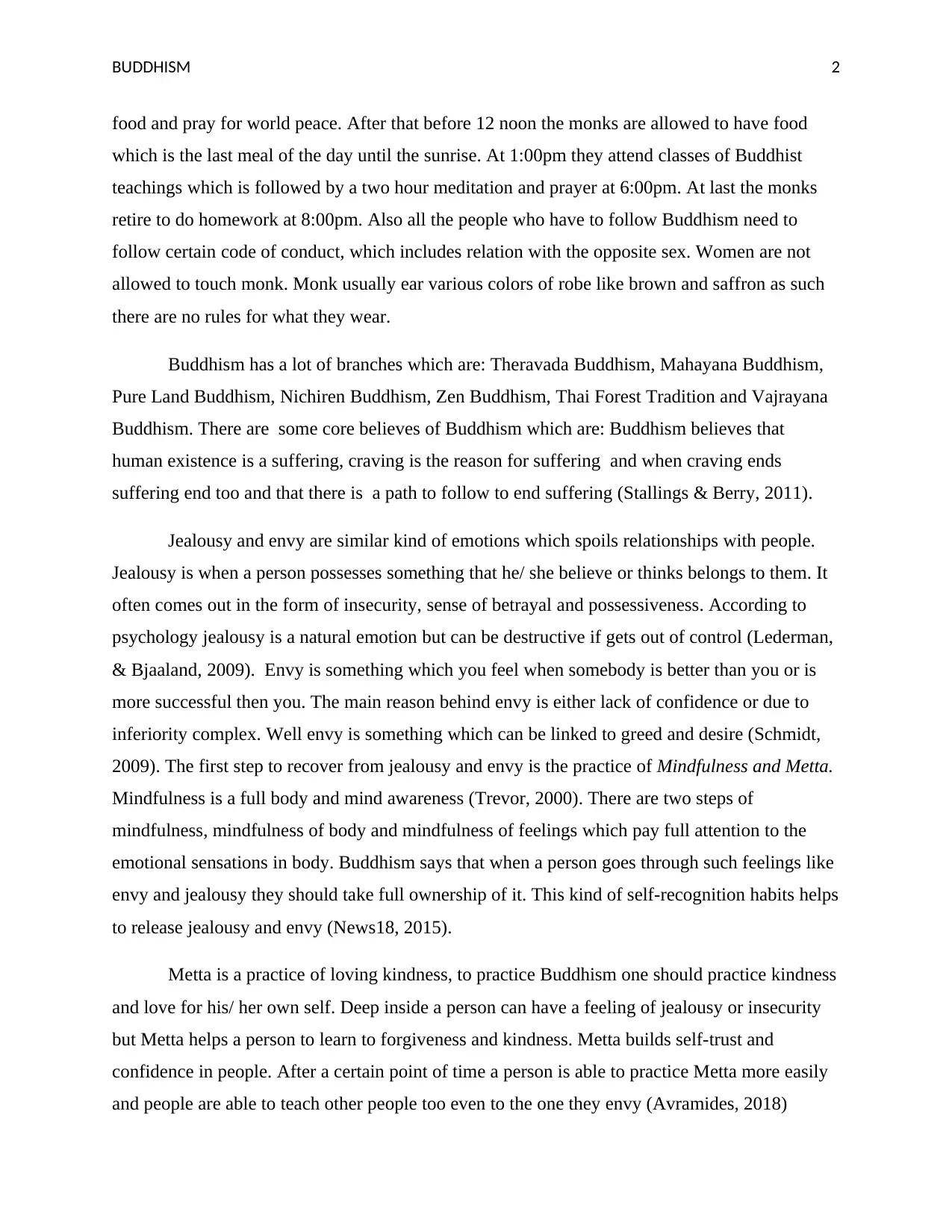
BUDDHISM 2
food and pray for world peace. After that before 12 noon the monks are allowed to have food
which is the last meal of the day until the sunrise. At 1:00pm they attend classes of Buddhist
teachings which is followed by a two hour meditation and prayer at 6:00pm. At last the monks
retire to do homework at 8:00pm. Also all the people who have to follow Buddhism need to
follow certain code of conduct, which includes relation with the opposite sex. Women are not
allowed to touch monk. Monk usually ear various colors of robe like brown and saffron as such
there are no rules for what they wear.
Buddhism has a lot of branches which are: Theravada Buddhism, Mahayana Buddhism,
Pure Land Buddhism, Nichiren Buddhism, Zen Buddhism, Thai Forest Tradition and Vajrayana
Buddhism. There are some core believes of Buddhism which are: Buddhism believes that
human existence is a suffering, craving is the reason for suffering and when craving ends
suffering end too and that there is a path to follow to end suffering (Stallings & Berry, 2011).
Jealousy and envy are similar kind of emotions which spoils relationships with people.
Jealousy is when a person possesses something that he/ she believe or thinks belongs to them. It
often comes out in the form of insecurity, sense of betrayal and possessiveness. According to
psychology jealousy is a natural emotion but can be destructive if gets out of control (Lederman,
& Bjaaland, 2009). Envy is something which you feel when somebody is better than you or is
more successful then you. The main reason behind envy is either lack of confidence or due to
inferiority complex. Well envy is something which can be linked to greed and desire (Schmidt,
2009). The first step to recover from jealousy and envy is the practice of Mindfulness and Metta.
Mindfulness is a full body and mind awareness (Trevor, 2000). There are two steps of
mindfulness, mindfulness of body and mindfulness of feelings which pay full attention to the
emotional sensations in body. Buddhism says that when a person goes through such feelings like
envy and jealousy they should take full ownership of it. This kind of self-recognition habits helps
to release jealousy and envy (News18, 2015).
Metta is a practice of loving kindness, to practice Buddhism one should practice kindness
and love for his/ her own self. Deep inside a person can have a feeling of jealousy or insecurity
but Metta helps a person to learn to forgiveness and kindness. Metta builds self-trust and
confidence in people. After a certain point of time a person is able to practice Metta more easily
and people are able to teach other people too even to the one they envy (Avramides, 2018)
food and pray for world peace. After that before 12 noon the monks are allowed to have food
which is the last meal of the day until the sunrise. At 1:00pm they attend classes of Buddhist
teachings which is followed by a two hour meditation and prayer at 6:00pm. At last the monks
retire to do homework at 8:00pm. Also all the people who have to follow Buddhism need to
follow certain code of conduct, which includes relation with the opposite sex. Women are not
allowed to touch monk. Monk usually ear various colors of robe like brown and saffron as such
there are no rules for what they wear.
Buddhism has a lot of branches which are: Theravada Buddhism, Mahayana Buddhism,
Pure Land Buddhism, Nichiren Buddhism, Zen Buddhism, Thai Forest Tradition and Vajrayana
Buddhism. There are some core believes of Buddhism which are: Buddhism believes that
human existence is a suffering, craving is the reason for suffering and when craving ends
suffering end too and that there is a path to follow to end suffering (Stallings & Berry, 2011).
Jealousy and envy are similar kind of emotions which spoils relationships with people.
Jealousy is when a person possesses something that he/ she believe or thinks belongs to them. It
often comes out in the form of insecurity, sense of betrayal and possessiveness. According to
psychology jealousy is a natural emotion but can be destructive if gets out of control (Lederman,
& Bjaaland, 2009). Envy is something which you feel when somebody is better than you or is
more successful then you. The main reason behind envy is either lack of confidence or due to
inferiority complex. Well envy is something which can be linked to greed and desire (Schmidt,
2009). The first step to recover from jealousy and envy is the practice of Mindfulness and Metta.
Mindfulness is a full body and mind awareness (Trevor, 2000). There are two steps of
mindfulness, mindfulness of body and mindfulness of feelings which pay full attention to the
emotional sensations in body. Buddhism says that when a person goes through such feelings like
envy and jealousy they should take full ownership of it. This kind of self-recognition habits helps
to release jealousy and envy (News18, 2015).
Metta is a practice of loving kindness, to practice Buddhism one should practice kindness
and love for his/ her own self. Deep inside a person can have a feeling of jealousy or insecurity
but Metta helps a person to learn to forgiveness and kindness. Metta builds self-trust and
confidence in people. After a certain point of time a person is able to practice Metta more easily
and people are able to teach other people too even to the one they envy (Avramides, 2018)
⊘ This is a preview!⊘
Do you want full access?
Subscribe today to unlock all pages.

Trusted by 1+ million students worldwide
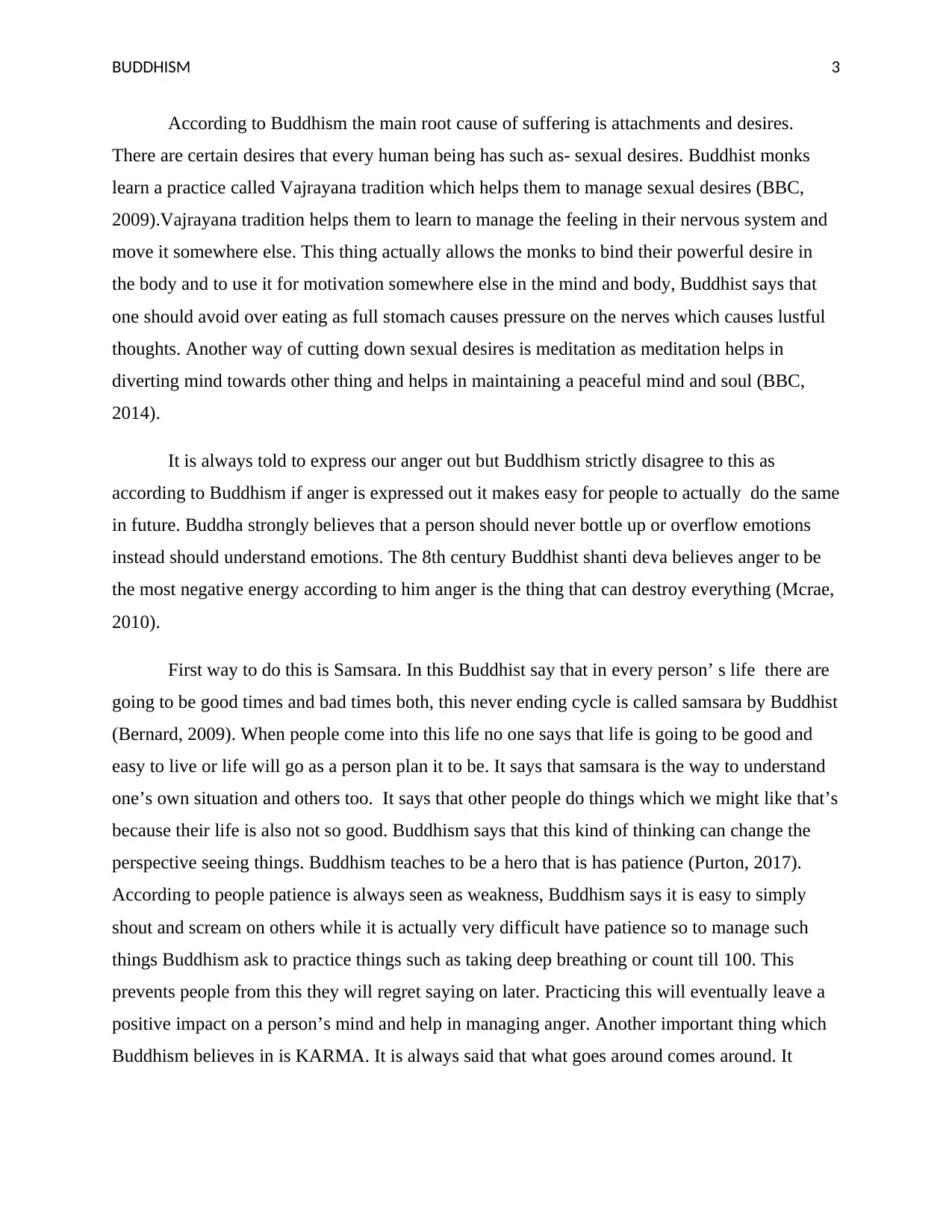
BUDDHISM 3
According to Buddhism the main root cause of suffering is attachments and desires.
There are certain desires that every human being has such as- sexual desires. Buddhist monks
learn a practice called Vajrayana tradition which helps them to manage sexual desires (BBC,
2009).Vajrayana tradition helps them to learn to manage the feeling in their nervous system and
move it somewhere else. This thing actually allows the monks to bind their powerful desire in
the body and to use it for motivation somewhere else in the mind and body, Buddhist says that
one should avoid over eating as full stomach causes pressure on the nerves which causes lustful
thoughts. Another way of cutting down sexual desires is meditation as meditation helps in
diverting mind towards other thing and helps in maintaining a peaceful mind and soul (BBC,
2014).
It is always told to express our anger out but Buddhism strictly disagree to this as
according to Buddhism if anger is expressed out it makes easy for people to actually do the same
in future. Buddha strongly believes that a person should never bottle up or overflow emotions
instead should understand emotions. The 8th century Buddhist shanti deva believes anger to be
the most negative energy according to him anger is the thing that can destroy everything (Mcrae,
2010).
First way to do this is Samsara. In this Buddhist say that in every person’ s life there are
going to be good times and bad times both, this never ending cycle is called samsara by Buddhist
(Bernard, 2009). When people come into this life no one says that life is going to be good and
easy to live or life will go as a person plan it to be. It says that samsara is the way to understand
one’s own situation and others too. It says that other people do things which we might like that’s
because their life is also not so good. Buddhism says that this kind of thinking can change the
perspective seeing things. Buddhism teaches to be a hero that is has patience (Purton, 2017).
According to people patience is always seen as weakness, Buddhism says it is easy to simply
shout and scream on others while it is actually very difficult have patience so to manage such
things Buddhism ask to practice things such as taking deep breathing or count till 100. This
prevents people from this they will regret saying on later. Practicing this will eventually leave a
positive impact on a person’s mind and help in managing anger. Another important thing which
Buddhism believes in is KARMA. It is always said that what goes around comes around. It
According to Buddhism the main root cause of suffering is attachments and desires.
There are certain desires that every human being has such as- sexual desires. Buddhist monks
learn a practice called Vajrayana tradition which helps them to manage sexual desires (BBC,
2009).Vajrayana tradition helps them to learn to manage the feeling in their nervous system and
move it somewhere else. This thing actually allows the monks to bind their powerful desire in
the body and to use it for motivation somewhere else in the mind and body, Buddhist says that
one should avoid over eating as full stomach causes pressure on the nerves which causes lustful
thoughts. Another way of cutting down sexual desires is meditation as meditation helps in
diverting mind towards other thing and helps in maintaining a peaceful mind and soul (BBC,
2014).
It is always told to express our anger out but Buddhism strictly disagree to this as
according to Buddhism if anger is expressed out it makes easy for people to actually do the same
in future. Buddha strongly believes that a person should never bottle up or overflow emotions
instead should understand emotions. The 8th century Buddhist shanti deva believes anger to be
the most negative energy according to him anger is the thing that can destroy everything (Mcrae,
2010).
First way to do this is Samsara. In this Buddhist say that in every person’ s life there are
going to be good times and bad times both, this never ending cycle is called samsara by Buddhist
(Bernard, 2009). When people come into this life no one says that life is going to be good and
easy to live or life will go as a person plan it to be. It says that samsara is the way to understand
one’s own situation and others too. It says that other people do things which we might like that’s
because their life is also not so good. Buddhism says that this kind of thinking can change the
perspective seeing things. Buddhism teaches to be a hero that is has patience (Purton, 2017).
According to people patience is always seen as weakness, Buddhism says it is easy to simply
shout and scream on others while it is actually very difficult have patience so to manage such
things Buddhism ask to practice things such as taking deep breathing or count till 100. This
prevents people from this they will regret saying on later. Practicing this will eventually leave a
positive impact on a person’s mind and help in managing anger. Another important thing which
Buddhism believes in is KARMA. It is always said that what goes around comes around. It
Paraphrase This Document
Need a fresh take? Get an instant paraphrase of this document with our AI Paraphraser
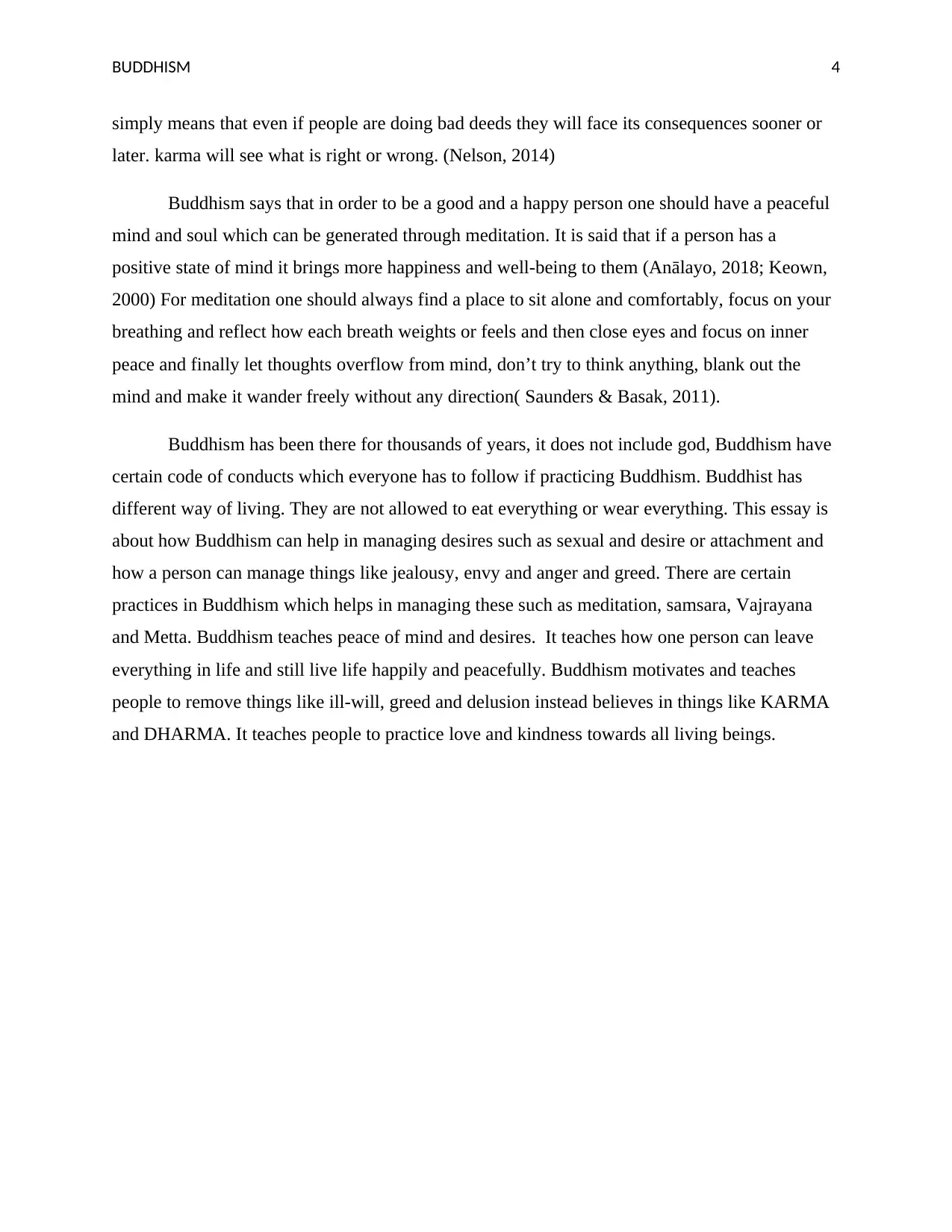
BUDDHISM 4
simply means that even if people are doing bad deeds they will face its consequences sooner or
later. karma will see what is right or wrong. (Nelson, 2014)
Buddhism says that in order to be a good and a happy person one should have a peaceful
mind and soul which can be generated through meditation. It is said that if a person has a
positive state of mind it brings more happiness and well-being to them (Anālayo, 2018; Keown,
2000) For meditation one should always find a place to sit alone and comfortably, focus on your
breathing and reflect how each breath weights or feels and then close eyes and focus on inner
peace and finally let thoughts overflow from mind, don’t try to think anything, blank out the
mind and make it wander freely without any direction( Saunders & Basak, 2011).
Buddhism has been there for thousands of years, it does not include god, Buddhism have
certain code of conducts which everyone has to follow if practicing Buddhism. Buddhist has
different way of living. They are not allowed to eat everything or wear everything. This essay is
about how Buddhism can help in managing desires such as sexual and desire or attachment and
how a person can manage things like jealousy, envy and anger and greed. There are certain
practices in Buddhism which helps in managing these such as meditation, samsara, Vajrayana
and Metta. Buddhism teaches peace of mind and desires. It teaches how one person can leave
everything in life and still live life happily and peacefully. Buddhism motivates and teaches
people to remove things like ill-will, greed and delusion instead believes in things like KARMA
and DHARMA. It teaches people to practice love and kindness towards all living beings.
simply means that even if people are doing bad deeds they will face its consequences sooner or
later. karma will see what is right or wrong. (Nelson, 2014)
Buddhism says that in order to be a good and a happy person one should have a peaceful
mind and soul which can be generated through meditation. It is said that if a person has a
positive state of mind it brings more happiness and well-being to them (Anālayo, 2018; Keown,
2000) For meditation one should always find a place to sit alone and comfortably, focus on your
breathing and reflect how each breath weights or feels and then close eyes and focus on inner
peace and finally let thoughts overflow from mind, don’t try to think anything, blank out the
mind and make it wander freely without any direction( Saunders & Basak, 2011).
Buddhism has been there for thousands of years, it does not include god, Buddhism have
certain code of conducts which everyone has to follow if practicing Buddhism. Buddhist has
different way of living. They are not allowed to eat everything or wear everything. This essay is
about how Buddhism can help in managing desires such as sexual and desire or attachment and
how a person can manage things like jealousy, envy and anger and greed. There are certain
practices in Buddhism which helps in managing these such as meditation, samsara, Vajrayana
and Metta. Buddhism teaches peace of mind and desires. It teaches how one person can leave
everything in life and still live life happily and peacefully. Buddhism motivates and teaches
people to remove things like ill-will, greed and delusion instead believes in things like KARMA
and DHARMA. It teaches people to practice love and kindness towards all living beings.
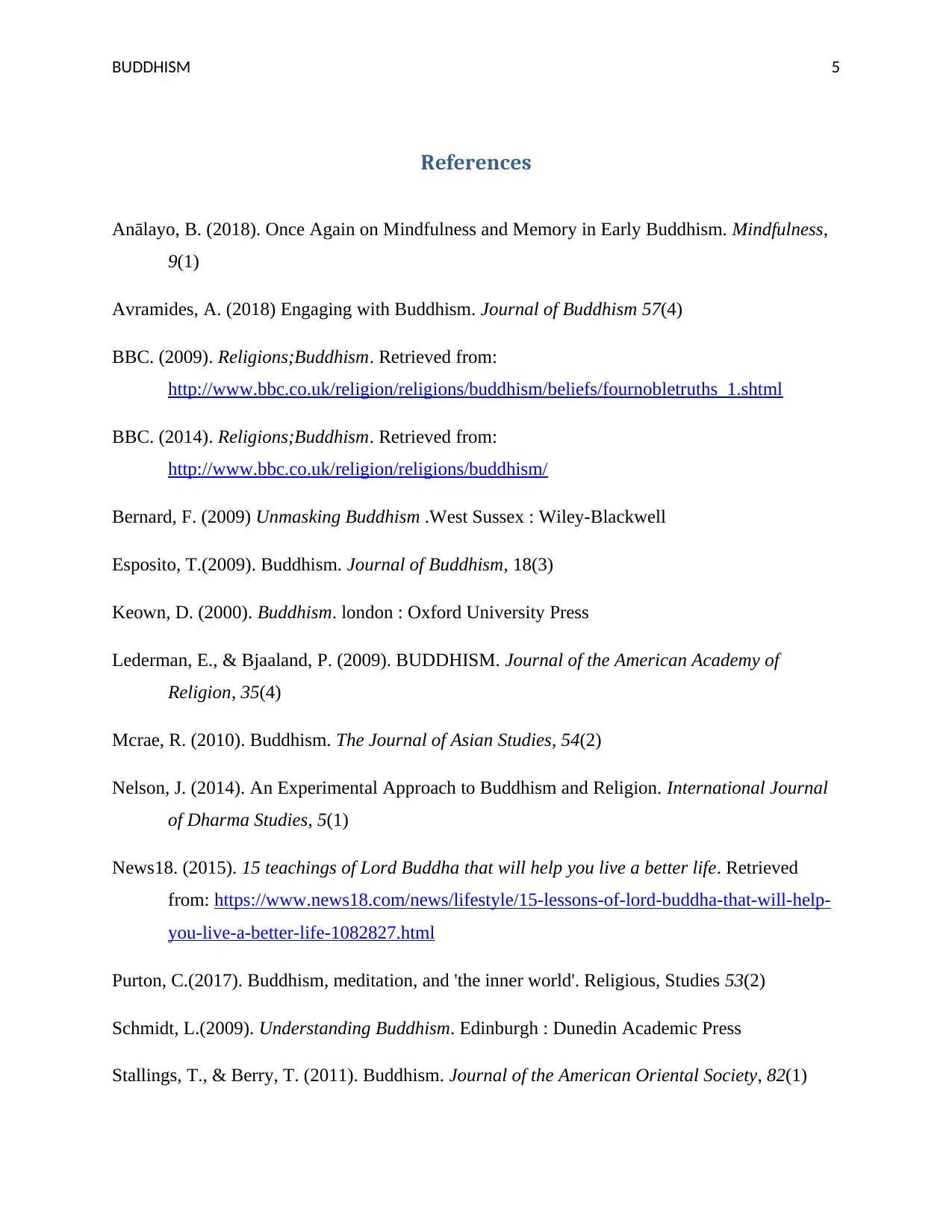
BUDDHISM 5
References
Anālayo, B. (2018). Once Again on Mindfulness and Memory in Early Buddhism. Mindfulness,
9(1)
Avramides, A. (2018) Engaging with Buddhism. Journal of Buddhism 57(4)
BBC. (2009). Religions;Buddhism. Retrieved from:
http://www.bbc.co.uk/religion/religions/buddhism/beliefs/fournobletruths_1.shtml
BBC. (2014). Religions;Buddhism. Retrieved from:
http://www.bbc.co.uk/religion/religions/buddhism/
Bernard, F. (2009) Unmasking Buddhism .West Sussex : Wiley-Blackwell
Esposito, T.(2009). Buddhism. Journal of Buddhism, 18(3)
Keown, D. (2000). Buddhism. london : Oxford University Press
Lederman, E., & Bjaaland, P. (2009). BUDDHISM. Journal of the American Academy of
Religion, 35(4)
Mcrae, R. (2010). Buddhism. The Journal of Asian Studies, 54(2)
Nelson, J. (2014). An Experimental Approach to Buddhism and Religion. International Journal
of Dharma Studies, 5(1)
News18. (2015). 15 teachings of Lord Buddha that will help you live a better life. Retrieved
from: https://www.news18.com/news/lifestyle/15-lessons-of-lord-buddha-that-will-help-
you-live-a-better-life-1082827.html
Purton, C.(2017). Buddhism, meditation, and 'the inner world'. Religious, Studies 53(2)
Schmidt, L.(2009). Understanding Buddhism. Edinburgh : Dunedin Academic Press
Stallings, T., & Berry, T. (2011). Buddhism. Journal of the American Oriental Society, 82(1)
References
Anālayo, B. (2018). Once Again on Mindfulness and Memory in Early Buddhism. Mindfulness,
9(1)
Avramides, A. (2018) Engaging with Buddhism. Journal of Buddhism 57(4)
BBC. (2009). Religions;Buddhism. Retrieved from:
http://www.bbc.co.uk/religion/religions/buddhism/beliefs/fournobletruths_1.shtml
BBC. (2014). Religions;Buddhism. Retrieved from:
http://www.bbc.co.uk/religion/religions/buddhism/
Bernard, F. (2009) Unmasking Buddhism .West Sussex : Wiley-Blackwell
Esposito, T.(2009). Buddhism. Journal of Buddhism, 18(3)
Keown, D. (2000). Buddhism. london : Oxford University Press
Lederman, E., & Bjaaland, P. (2009). BUDDHISM. Journal of the American Academy of
Religion, 35(4)
Mcrae, R. (2010). Buddhism. The Journal of Asian Studies, 54(2)
Nelson, J. (2014). An Experimental Approach to Buddhism and Religion. International Journal
of Dharma Studies, 5(1)
News18. (2015). 15 teachings of Lord Buddha that will help you live a better life. Retrieved
from: https://www.news18.com/news/lifestyle/15-lessons-of-lord-buddha-that-will-help-
you-live-a-better-life-1082827.html
Purton, C.(2017). Buddhism, meditation, and 'the inner world'. Religious, Studies 53(2)
Schmidt, L.(2009). Understanding Buddhism. Edinburgh : Dunedin Academic Press
Stallings, T., & Berry, T. (2011). Buddhism. Journal of the American Oriental Society, 82(1)
⊘ This is a preview!⊘
Do you want full access?
Subscribe today to unlock all pages.

Trusted by 1+ million students worldwide

BUDDHISM 6
Stephenson, A.(2010). BUDDHISM. Journal of the American Academy of Religion, 2(4)
Trevor, L. (2000) Buddhism. London : Ward Lock International
Stephenson, A.(2010). BUDDHISM. Journal of the American Academy of Religion, 2(4)
Trevor, L. (2000) Buddhism. London : Ward Lock International
1 out of 7
Related Documents
Your All-in-One AI-Powered Toolkit for Academic Success.
+13062052269
info@desklib.com
Available 24*7 on WhatsApp / Email
![[object Object]](/_next/static/media/star-bottom.7253800d.svg)
Unlock your academic potential
Copyright © 2020–2026 A2Z Services. All Rights Reserved. Developed and managed by ZUCOL.



